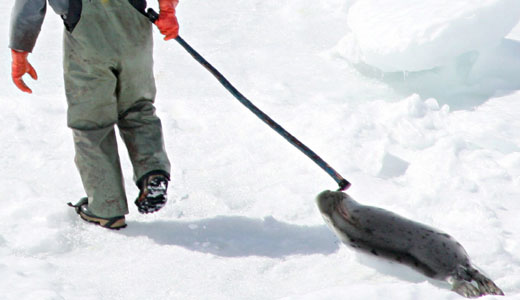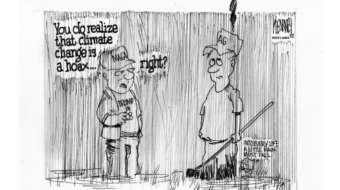
Sealing – a grotesque business that involves killing seals for both their fur and meat – may soon see its last days in Canada. With the consumption of seal products dropping, Canadian Parliament member Ryan Cleary believes that sealing may become a thing of the past.
Cleary said that Canada and its province Newfoundland and Labrador have been taking flack from critics of commercial seal hunting, and that the sealing industry was worth just $1 million to Newfoundland and Labrador last year – a clear sign that desire for seal products is waning.
This wouldn’t be the first time that excessive killing of animals came to an end, Cleary pointed out. “Part of our history is also whaling, for example, and the day came when the whaling industry stopped,” he said. “Now, is that day coming with the seal hunt? It just may be.”
Perhaps the largest piece of evidence to support this assertion comes from outside of Canada: the countries of Russia, Belarus and Kazahkstan have banned the import and export of seal pelts.
Seal hunting has been vehemently criticized by celebrities like Pamela Anderson and Kelly Osbourne, and musicians including metalcore band The Agonist and singer Sarah McLachlan. World leaders like President Obama and Vladimir Putin have also said they disapprove of sealing.
Opposition to sealing from such notable names may have added to the initiative of Canadians to avoid seal products, or changed their opinions on the way these animals have been treated.
The controversial practice involves the deaths of thousands of seals, including young pups. They are savagely beaten over the head, hooked in the eyes, nose, or mouth, and pulled across the ice, often while still alive.
Sealing is more devastating during a time when seal pups are dropping off at a dramatic rate, due to thinning winter sea ice, as found in a study by scientists from Duke University and the International Fund for Animal Welfare. The study concluded, moreover, that sea ice cover (in areas that serve as breeding regions for harp seals) has been declining by about 6 percent per decade for quite some time, due to climate change.
David Johnston, research scientist at the Duke University Marine Lab, remarked, “The kind of mortality we’re seeing in eastern Canada is dramatic.”
After finding that 80 percent of the seal pups born in 2011 died due to lack of ice, IFAW has said that Canada ought to work toward ending the seal hunt for good, noting that all hunters should be compensated fairly for their work and retrained for other jobs.
“It is time for the Canadian government to face the reality that commercial seal hunting is neither viable nor necessary,” said the organization.
“We know that the world appetite is [no longer] there for seal meat,” said Cleary. And, “the world appetite for seal products … I don’t know if it’s there [either]. And you know what? I might get shot for saying this – but that’s a question we all have to ask.”
Photo: A seal hunter drags a slaughtered seal back to his snowmobile during an annual seal hunt in the Gulf of St. Lawrence. Jonathan Hayward/AP










